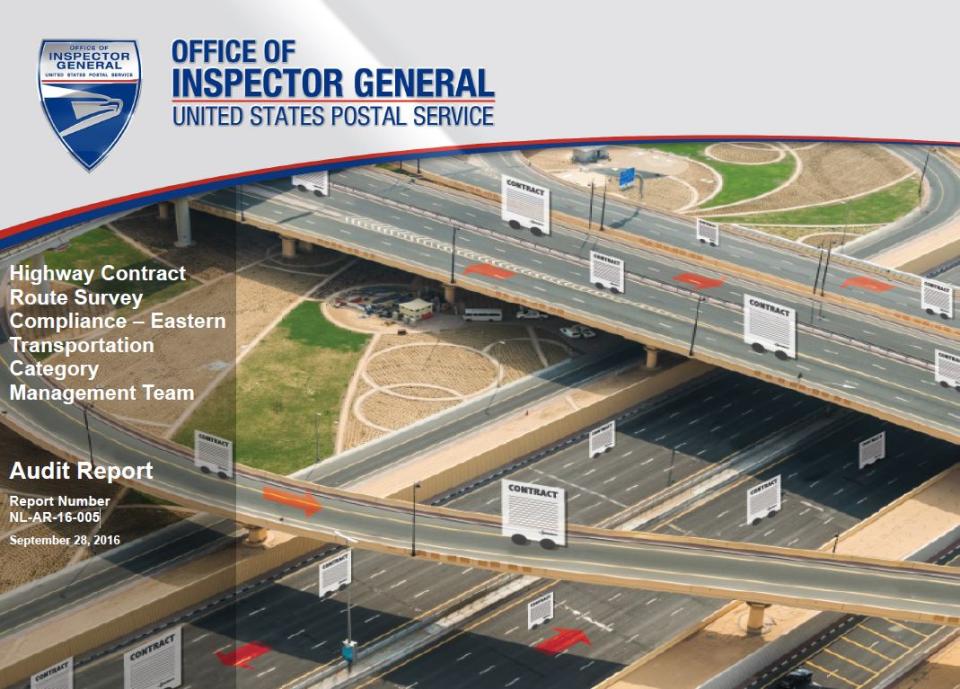Highway Contract Route Survey Compliance – Eastern Transportation Category Management Team
Background
Highway Contract Routes (HCR) are used to transport mail between plants, post offices, or other designated points where mail is received or dispatched. In fiscal year (FY) 2015, the U.S. Postal Service spent about $2.9 billion on about 8,200 HCR transportation contracts.
HCRs are the Postal Service’s largest single group of contracts managed by the Network Operations, Delivery Operations, and Supply Management groups. Transportation and network specialists (TANS) and postmasters develop HCR schedules to meet operational requirements and perform administrative functions, which include conducting required route surveys (reviews) for HCR contract renewals.
Contracting officers (CO) and the Transportation Category Management Teams (TCMT) are in Largo, MD, Windsor, CT, Denver, CO, Memphis, TN, and Tacoma, WA; with a satellite office in San Juan, Puerto Rico. These groups administer the HCR contracts.
Postal Service policy, Management Instruction SP-CS-2009-1, Conducting Highway Contract Route Surveys, requires the assigned administrative official (AO) to survey routes during the fall of the year before the contract expires. The purpose of the survey is to obtain current and accurate route information. These route surveys help COs and TCMTs determine route continuations and adjustments, truck requirements, and operational changes that can affect HCR costs.
Our objective was to determine the effective use and management of HCR surveys by the Eastern Transportation Category Management Team. This is one in a series of projects on HCR oversight.
What the OIG Found
We found that the AOs rarely completed HCR surveys and the Eastern TCMT never used them as required for contract renewals.
We statistically selected 176 of the 1,174 renewed HCR contracts for calendar years (CY) 2014 and 2015 in the Eastern TCMT. We reviewed both the hard copy and electronically maintained contract files and did not locate any HCR surveys for the 176 sampled contracts. The responsible CO could not provide copies of any of these surveys and indicated that none were received from area offices.
We also contacted 86 AOs responsible for conducting HCR surveys for the 176 sampled contracts to determine the total number of HCR surveys completed. These AOs reported that 60 HCR surveys were completed; however, they could only provide documents to support 17 completed HCR surveys. The remaining 159 HCR surveys, or 90 percent, were not completed as required. Furthermore, the 17 or 10 percent completed HCR surveys were not in the HCR contract files. Consequently, COs for the Eastern TCMT renewed HCR contracts we reviewed without any completed surveys.
This occurred because 40 percent of the AOs were not familiar with the requirement or the process. Further, 57 percent were not conducting HCR surveys due to a lack of training and management oversight. In addition, there is no central management tool available to AOs or COs to track completion of HCR surveys.
The Postal Service issued an HCR survey policy in January 2009, but has not updated it to accurately reflect current organizational structure, job titles, roles, and responsibilities. Therefore, there is no clear guidance for AOs, area managers, Network Operations personnel, district managers, COs, or TCMT specialists on their current roles and responsibilities for conducting HCR surveys. The CO for the Eastern TCMT confirmed during the audit that they do not follow up or wait for the HCR surveys for contract renewals.
As a result, we estimated the Postal Service incurred unsupported questioned costs for HCR contracts of about $109.1 million in CY 2014 and $128.1 million in CY 2015 because the required contract renewal HCR surveys were not completed.
What the OIG Recommended
We recommended management establish formalized annual AO training for conducting and completing HCR surveys; develop a centralized management tool for AOs to report and COs to manage HCR survey compliance; update policies to reflect current job titles, roles, and responsibilities; and provide for annual updates.

